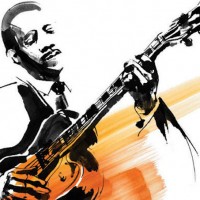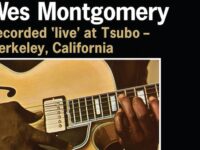Dismissed late in life as a sell-out entertainer, Wes Montgomery — you’re reminded all over again, with this group of previously unreleased sides — could play with both an uncanny smoothness and a sharp improvisational wit.
Executive producer Michael Cuscuna surmises the tapes featured on Echoes of Indiana Avenue were made in order to secure Montgomery’s initial record deal with Pacific Jazz in the spring of 1958. Little was known about them, as they bounced around from collector to collector, though Cuscuna and others were finally able to construct a list of sidemen that included brothers Monk and Buddy Montgomery, on bass and piano respectively; drummer Sonny Johnson; keyboardist Melvin Rhyne, bassist Mingo Jones, and others. In all, nine tracks find their long-awaited release today through Resonance Records, five in the studio and four of them from live performances in Montgomery’s hometown of Indianapolis.
These recordings would be important enough, even if all they represented was the first new music in more than 25 years from one of the genre’s most important — though widely misunderstood — guitarists. Instead, what they reveal is a hard-edged ferocity that might surprise those who dare overlook Montgomery.
His playing style was, at least initially, to blame for those dismissals. Montgomery plucked the strings, in a moment of corn-pone brilliance, with his thumb rather than making use of a pick. That tended to give his playing this warm, undulating tone — almost without edges — and it opened the door for something that doomed him with critics: Montgomery’s eventual transition out of straight-ahead jazz toward more mainstream fare. By the time Montgomery started issuing a series of best-selling, no star-getting late-career recordings for Verve and A&M, his sound had become as comfy and soft as a dryer sheet.
Not here. Echoes of Indiana Avenue, from the fizzy Latin-informed opener “Diablo’s Dance” to the be-bop/blues of “Straight No Chaser” to the sizzling redo of “Take The A Train” to the remarkably funky delights of “After Hours Blues,” instead showcases an early-career guitarist who’s simply bursting with new ideas. At the same time, Montgomery dives into the deepest, inky depths of “‘Round Midnight,” and the sweetest romantic underpinnings of “Darn That Dream” — performances that are as expressive as any he ever recorded. The truth is, Montgomery almost always sounded better in a small group (with a notable exception being the Oliver Nelson-charted Dynamic Duo recording alongside organist Jimmy Smith), and this album underscores how necessary that kind of musical space was for Montgomery to move around. He needed the quiet.
[SOMETHING ELSE! INTERVIEW: Jimmy Cobb, drummer on 1965’s Smokin’ at the Half Note, talks about the forces that drove Wes Montgomery into pop commercialism — and ultimately took his life.]
Self-taught, Montgomery’s initial experiments with this creamy thumb-picking sound were purely the result of his trying not to disturb the neighbors while he practiced after work. Soon, Montgomery had built up his own craft enough to tour in the late 1940s with Lionel Hampton, but he was still holding down a day job to support a family that had grown to seven children. This sense of personal responsibility, rather than some failure of artistic vision, likely led Montgomery past his own well-established successes in jazz (in particular around the turn of the 1960s) into a series of moneymaking ventures in pop music. He continued to tour into the latter part of the decade, even while working 9 to 5 — until the summer of 1968, when a heart attack felled him in his early 40s.
That hard-bitten end is all the more ironic since it always seemed to come so easy for Montgomery, a guitarist who played without reading music — and made it look effortless. Sometimes, of course, it’s clear that he should have been more attentive with his gift. Even at Montgomery’s most brilliant, and you certainly hear the embryonic makings of a jazz legend here, Montgomery borrowed liberally from his stylistic hero Django Reinhardt — in particular, in the way he’d unfurl these remarkable octave runs. You got the sense that Montgomery sometimes took his out-of-nowhere command of the instrument for granted, in particular when you didn’t know the back story. It’s not hard to see how people could accuse him of cuckolding his muse with a turn toward the creative inertia of Top 40 remakes.
But all of that’s out over the next horizon at this point. On these sides, Montgomery is still working several jobs then cobbling together gigs in his off time, but he’s loving every minute of it. You hear that, like a veritable thunderclap of joy, over and over again on Echoes of Indiana Avenue. There’s no apologizing for Montgomery’s craftsmanship here, no rationalizing his bursts of intellect amidst the overt commercialism of, say, that Grammy award-winning 1966 take on “Goin’ Out of My Head.”
It’s all out in front of him, and he’s tearing through every song, trying to get there.
- Nick DeRiso’s Best of 2015 (Rock + Pop): Death Cab for Cutie, Joe Jackson, Toto + Others - January 18, 2016
- Nick DeRiso’s Best of 2015 (Blues, Jazz + R&B): Boz Scaggs, Gavin Harrison, Alabama Shakes - January 10, 2016
- Nick DeRiso’s Best of 2015 (Reissues + Live): John Oates, Led Zeppelin, Yes, Faces + others - January 7, 2016





A very hip and insightful review of Wes! I had the pleasure of selling Wes a guitar case one day, when I was working as a clerk (not an associate) in Wallichs Music City, located at the corner of Sunset and Vine in Hollywood, California, back in the day. Wes was a true gentleman — and a true original.
I was somewhat surprised to see that he was dissed in his later years. The folks I hung with always held Wes in the highest esteem. I remember when he recorded an acquaintance of mine’s song — Danny Fores, aka Chuck Rio. The tune was TEQUILA!
MORT WEISS–OUT!
Wes’ brother Monk was the first cat to use a Fender electric bass on a jazz record. Cats like Marcus Miller and my old friend Dave Carpenter (RIP) took it to the next level: See and hear Dave on a Fender with Buddy Rich on YouTube, and the tune “If I Were a Bell.” Oh, the kid on piano? My man Bill Cunliffe.
MORT WEISS–OUT!
One more thing — Dave, and many others, went back to the acoustic bass. Thank the great turtle on the rock!
MORT